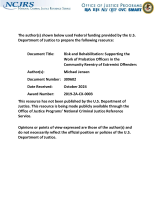Solid Start: Supportive housing, social support, and reentry transitions
Journal
Journal of Crime and Justice
Date Published
June 2015
Agencies
NIJ-Sponsored
Publication Type
Program/Project Evaluation



